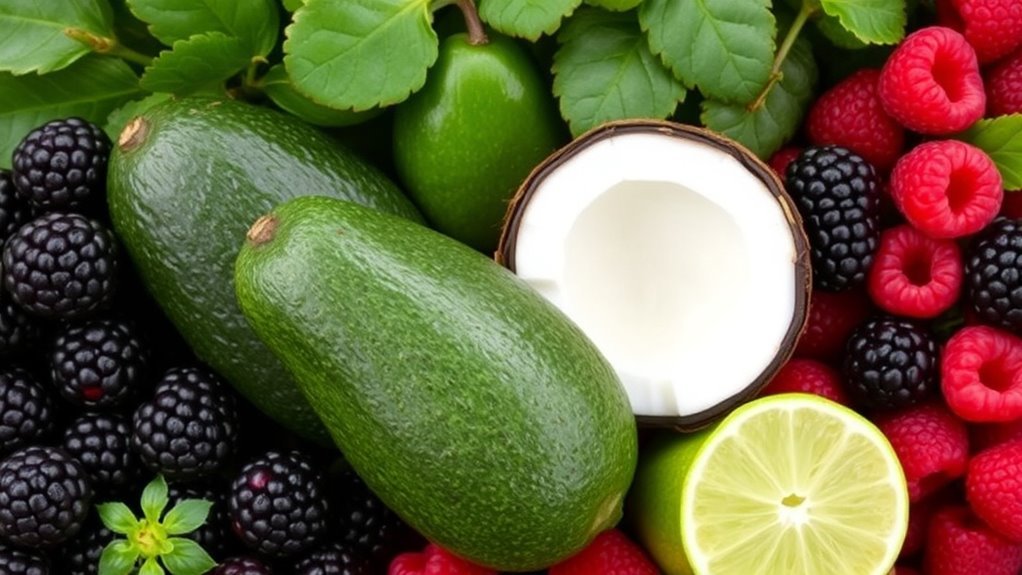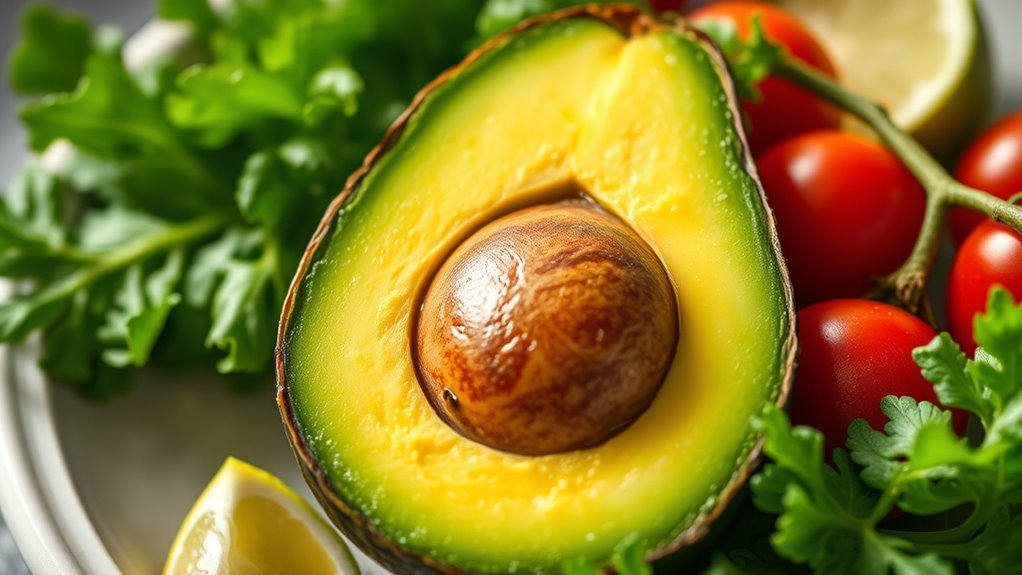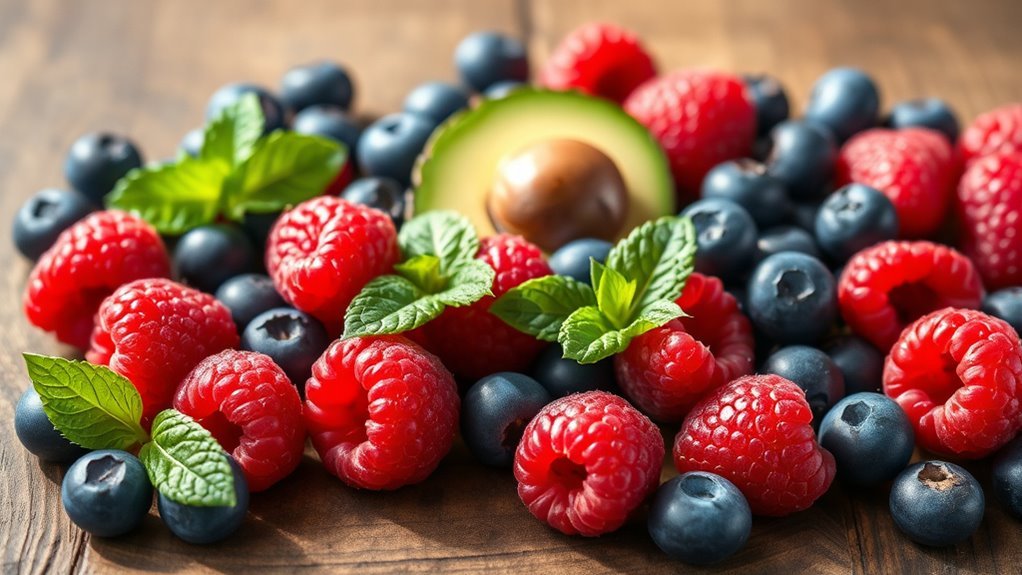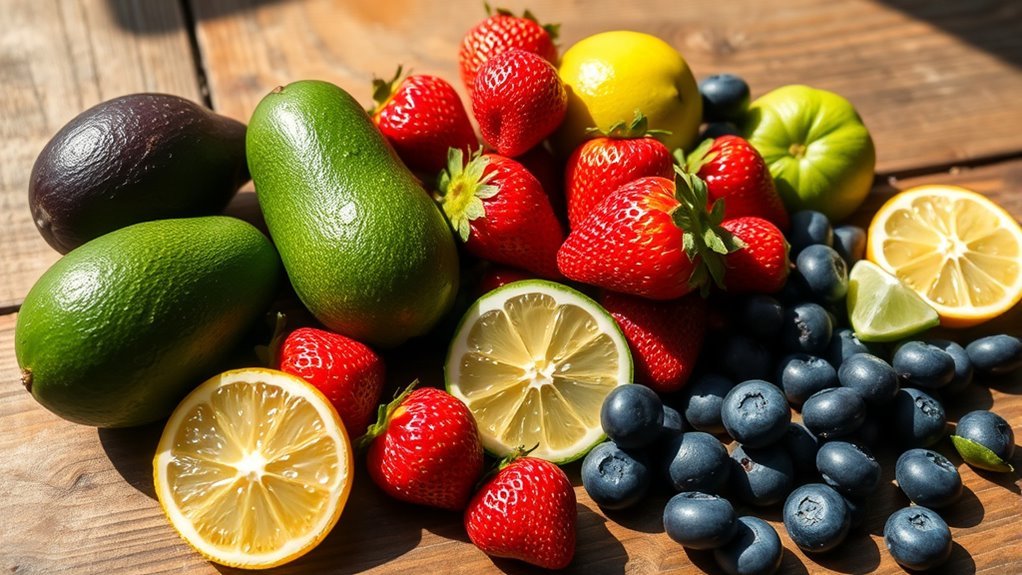If you’re looking for keto-friendly fruits, you’ve got great options! Avocados are super low in net carbs, while berries like strawberries and raspberries are packed with antioxidants. Coconut, lemons, and limes are also excellent choices, providing flavor without jeopardizing ketosis. Additionally, olives are savory and satisfying, making them perfect for snacking. These fruits not only help maintain low carbohydrate intake but also support overall health. There’s more to explore about tasty keto options ahead!
The Basics of Keto and Carbohydrates

While you might already know that the ketogenic diet focuses on low carbohydrate intake, understanding the role of carbohydrates is essential for anyone considering this lifestyle. The keto diet basics revolve around drastically reducing carbs to induce ketosis, a metabolic state where your body burns fat for fuel. Typically, carbohydrate limits range from 20 to 50 grams per day, depending on individual needs and activity levels. This restriction helps stabilize blood sugar levels and promotes fat loss. It’s important to choose your carbs wisely, focusing on fiber-rich and nutrient-dense sources. By doing so, you can maintain energy levels while enjoying the freedom that a well-planned keto diet provides, ensuring you stay on track without feeling deprived.
Avocado: The Creamy Superfruit

Avocado is often hailed as a superfruit, and for good reason. With its rich nutritional profile, it provides healthy fats, fiber, and essential vitamins that align perfectly with a keto diet. Understanding its health benefits can help you make the most of this creamy fruit in your meals.
Nutritional Profile Overview
Known for its creamy texture and versatility, the avocado stands out as a nutritional powerhouse among keto-friendly fruits. Its unique profile makes it a favorite for those watching their carbohydrate content. Compared to other fruit varieties, avocados are low in carbs and high in healthy fats, making them ideal for a keto diet.
- Rich in monounsaturated fats
- Loaded with fiber
- Packed with essential vitamins and minerals
One medium avocado contains about 12 grams of carbohydrates, but with around 9 grams of fiber, the net carbs become only 3 grams. This contributes to its status as a top choice for anyone seeking to maintain a low-carb lifestyle while still enjoying the benefits of fruit.
Health Benefits Explained
The creamy texture and rich flavor of avocado not only make it a delicious addition to meals but also provide numerous health benefits that align perfectly with a keto lifestyle. One of the key health advantages of avocados is their high content of healthy monounsaturated fats, which can help reduce bad cholesterol levels and support heart health. Additionally, they’re abundant in fiber, promoting digestive health and satiety—essential for those following a low-carb diet. Compared to other fruit varieties, avocados are low in sugar and net carbs, making them a perfect choice for maintaining ketosis. With vitamins like E and K, they also contribute to overall wellness. Embracing avocados in your diet can lead to a healthier, more balanced lifestyle.
Berries: Low-Carb Sweetness

While many fruits are off-limits on a keto diet due to their high sugar content, berries stand out as a low-carb option that can satisfy your sweet tooth without derailing your nutritional goals. These delicious berry varieties, like strawberries, raspberries, and blackberries, are not only low in carbohydrates but also packed with health benefits.
- Rich in antioxidants, helping combat oxidative stress
- Low glycemic index, making them ideal for blood sugar control
- High in fiber, promoting digestive health
Incorporating these berries into your diet can provide a flavorful way to enjoy fruit while reaping their antioxidant benefits. So, don’t hesitate to indulge in these tasty, keto-friendly berries!
Coconut: The Versatile Fruit
Berries aren’t the only fruits that fit into a keto lifestyle; coconuts also shine with their unique nutritional profile. Rich in healthy fats, coconuts support your ketogenic goals by providing a source of medium-chain triglycerides (MCTs), which can enhance fat burning. You can enjoy coconut in various forms, such as coconut oil, an excellent cooking fat that withstands high temperatures and adds flavor to your dishes. Additionally, coconut flour is a fantastic low-carb alternative to traditional flours, perfect for baking keto-friendly treats. With their high fiber content and minimal sugar, coconuts can help you stay satisfied and energized. Embrace this versatile fruit, and you’ll reveal new culinary possibilities while adhering to your keto journey.
Lemons and Limes: Zesty Flavor Boosters
When you’re looking to enhance your meals on a keto diet, lemons and limes can be indispensable allies. Their zesty flavors not only elevate dishes but also offer numerous health benefits.
- Low in carbs: Perfect for your keto lifestyle.
- Rich in vitamin C: Supports immune health and skin health.
- Versatile in cooking: Ideal for marinades, dressings, and beverages.
Mastering lemon zesting techniques allows you to capture vibrant flavors, while lime juice uses can brighten up even the simplest meals. A splash of lime juice in your water or a sprinkle of lemon zest on grilled chicken can transform your dining experience. Embrace these citrus fruits for a invigorating twist on your keto journey!
Rhubarb: Tart and Tasty
Rhubarb is a unique addition to your keto-friendly diet, offering low carbs and a rich source of vitamins K and C. Its tart flavor makes it versatile in various culinary applications, from savory dishes to desserts. Let’s explore how you can incorporate rhubarb into your meals while reaping its nutritional benefits.
Nutritional Benefits of Rhubarb
Although often overlooked in the fruit category, rhubarb offers a range of nutritional benefits that make it a valuable addition to a keto-friendly diet. Packed with essential vitamins and minerals, it can enhance your health while keeping carbs low.
- Low in Calories: Rhubarb is a low-calorie food, making it easy to incorporate into your meals without guilt.
- Rich in Antioxidants: It contains antioxidants that combat free radicals, promoting overall wellness.
- High in Fiber: With its high fiber content, rhubarb supports digestion and helps maintain a healthy gut.
Incorporating rhubarb into your diet can provide these rhubarb benefits, making it a versatile ingredient for various rhubarb recipes. Enjoy its tartness while reaping the rewards!
Culinary Uses and Recipes
While many might not consider rhubarb a staple in their kitchen, its unique tart flavor makes it a versatile ingredient in a variety of dishes. You can use rhubarb in both sweet and savory recipes. For a delicious dessert, try a rhubarb crumble paired with keto-friendly sweeteners. You might also enjoy rhubarb chutney, which complements grilled meats beautifully. When it comes to fruit pairings, rhubarb works well with strawberries, blueberries, and apples, enhancing their natural sweetness. For a revitalizing drink, consider a rhubarb-infused sparkling water. These recipe ideas not only highlight rhubarb’s tangy profile but also align with a keto lifestyle, allowing you to enjoy this unusual fruit in diverse and flavorful ways.
Tomatoes: A Surprising Keto-Friendly Option
When you think about keto-friendly foods, tomatoes might not be the first option that comes to mind, but they’re actually a great choice for those following a low-carb lifestyle. Packed with nutrients and low in carbs, tomatoes can be incorporated into various keto recipes, providing flavor and versatility.
- Different tomato varieties, like cherry, grape, and heirloom, offer unique tastes and textures.
- They’re rich in vitamins C and K, and antioxidants that support overall health.
- Tomatoes can be easily added to salads, soups, or sauces without sabotaging your carb count.
Olives: Savory and Satisfying Choices
After exploring the versatility of tomatoes, it’s time to contemplate another keto-friendly option: olives. These little fruits pack a flavorful punch and come in various olive varieties, including Kalamata, green, and black. Each type offers unique taste profiles, making them a delightful addition to salads or snacks. Rich in healthy fats, olives can help you meet your daily macronutrient goals without spiking your blood sugar. Plus, olive oil, derived from these fruits, is a staple in keto diets. It’s high in monounsaturated fats, which support heart health and can enhance meal flavors. So, whether you enjoy them whole or as oil, olives are satisfying choices that align perfectly with your keto lifestyle.
Frequently Asked Questions about Keto-Friendly Fruits
1. What fruits are considered keto-friendly?
Keto-friendly fruits are typically low in carbohydrates and sugar. Some of the best options include berries such as strawberries, blueberries, raspberries, and blackberries. Avocado and olives are also excellent choices due to their healthy fats and low carb content. Other options can include tomatoes and certain melons, but it’s essential to monitor portion sizes to stay within your daily carb limit.
2. Can I eat bananas on a keto diet?
Bananas are not considered keto-friendly due to their higher carbohydrate and sugar content. A medium banana contains about 27 grams of carbs, which can quickly exceed the daily carb limit for those on a strict ketogenic diet. If you’re following a keto diet, it’s best to avoid bananas and choose lower-carb fruits instead.
3. How many carbs should I aim for when consuming fruits on a keto diet?
On a standard ketogenic diet, the typical daily carbohydrate intake ranges from 20 to 50 grams. When including fruits, it’s crucial to account for their carb content. Focus on portion control and select fruits that are lower in carbs, such as berries, to ensure you stay within your daily limit while still enjoying the benefits of fruit.
4. Are there any fruits I should completely avoid on a keto diet?
Yes, certain fruits are best avoided on a keto diet due to their high sugar and carbohydrate content. These include grapes, bananas, cherries, and most tropical fruits like mangoes and pineapples. Instead, opt for low-carb fruits like berries and avocados to satisfy your sweet cravings while maintaining ketosis.
5. Can dried fruits be included in a keto diet?
Dried fruits are generally not recommended on a keto diet because they are concentrated sources of sugar and carbs. For example, a small serving of dried apricots can contain upwards of 30 grams of carbs. If you crave something sweet, it’s better to stick with fresh, low-carb fruits and consume them in moderation.
References
- https://www.healthline.com/nutrition/keto-friendly-fruits
- https://www.medicalnewstoday.com/articles/keto-diet-fruits
- https://www.ncbi.nlm.nih.gov/pmc/articles/PMC6466272/
- https://www.verywellfit.com/keto-friendly-fruits-5197247
- https://www.dietdoctor.com/low-carb/fruits
- https://www.webmd.com/diet/what-is-the-keto-diet
- https://www.heart.org/enHealthy-Living/Healthy-Eating/Eat-Smart/Nutrition-Basics/Fruits-and-the-Keto-Diet
- https://www.mayoclinic.org/healthy-lifestyle/nutrition-and-healthy-eating/expert-answers/keto-diet/faq-20429035


